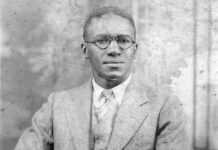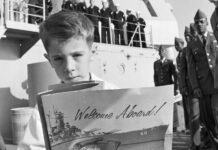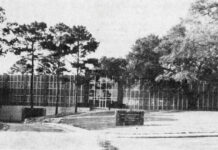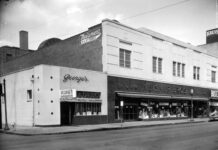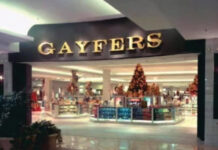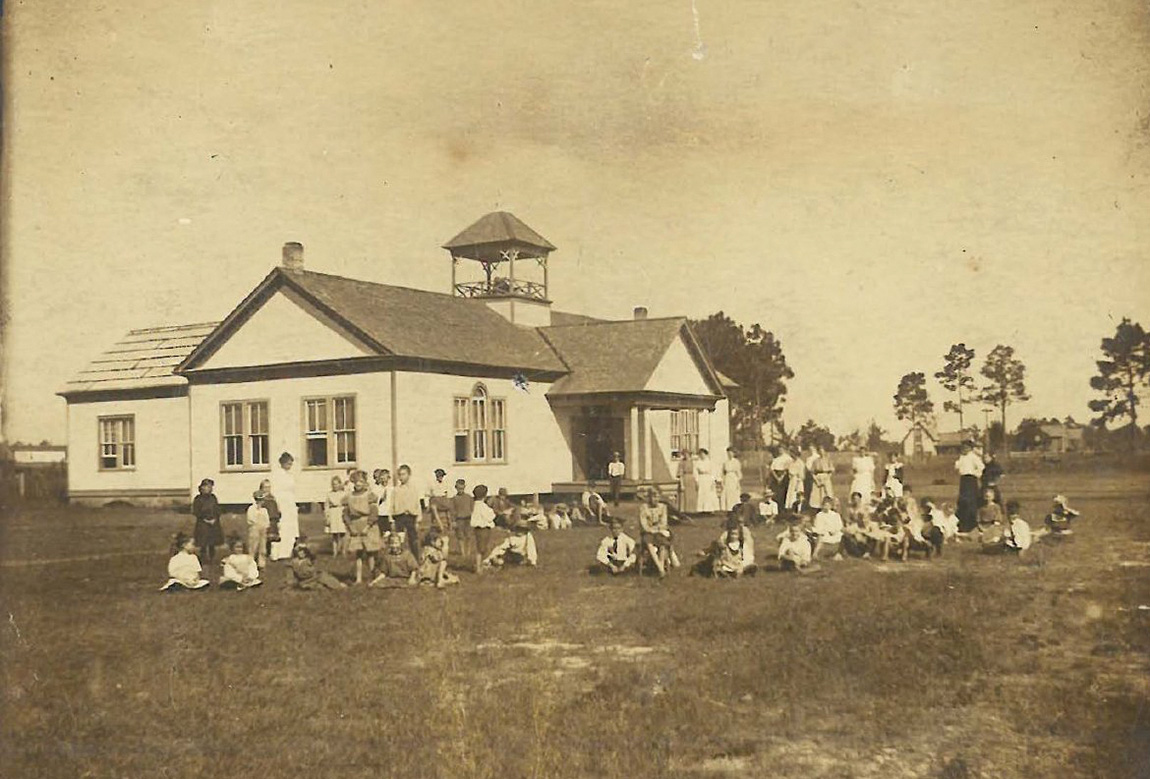
The Fairhope Courier from March 18, 1909, ran two side-by-side columns about a singular community gathering which stands out among the literary events of those early years of the seaside utopia. E. B. Gaston, publisher and editor of the paper, considered the town’s visionary and founder, reported on the event. In addition, Marie Howland, Fairhope’s first librarian, the newspaper’s associate editor, author of “Papa’s Own Girl” and suffragist, had “Mrs. Howland’s Letters” that offered a more personal account.
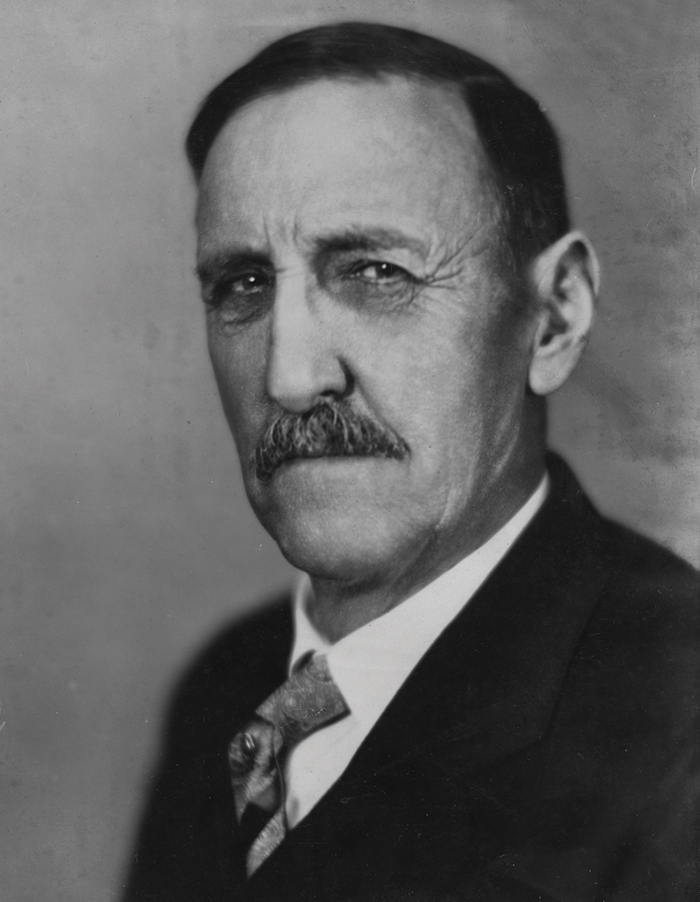
Gaston reported on the “Raw Food Banquet,” attended by “more than 100 persons … served at the tables set up in the North Room” of the Bell Building, then the campus of the Marietta Johnson’s School of Organic Education. The two-room Bell Building was constructed in 1904 for the public school. The back room was added in 1908. In 1909, a new public school building was constructed at the corner of Morphy Avenue and Church Street, and that same year, Marietta Johnson moved to the 10-acre campus which now houses Coastal Alabama Community College.
Renowned writer Upton Sinclair, along with his wife Meta, set up the supper. The Sinclairs were there while their son David was attending the School of Organic Education. While in Fairhope, the man who brought us “The Jungle,” which led to the passage of the Pure Food and Drug Act to regulate slaughterhouses, chucked his vegan diet for Salisbury steaks. Sinclair, upon arrival in the fall of 1908, changed his plant-based diet from raw foods like grains, fruits and vegetables after reading J. H. Salisbury who claimed white flour, sugar and lard were “making a yeastpot of your stomach.”
Sinclair, one of America’s most prolific writers, worked on what would become “Love’s Pilgrimage” while in Fairhope, where he was very productive. During a three-day fast at his cottage on the beach, he wrote a play, “The Naturewoman,” “a comedy sprang full-grown into my brain.”
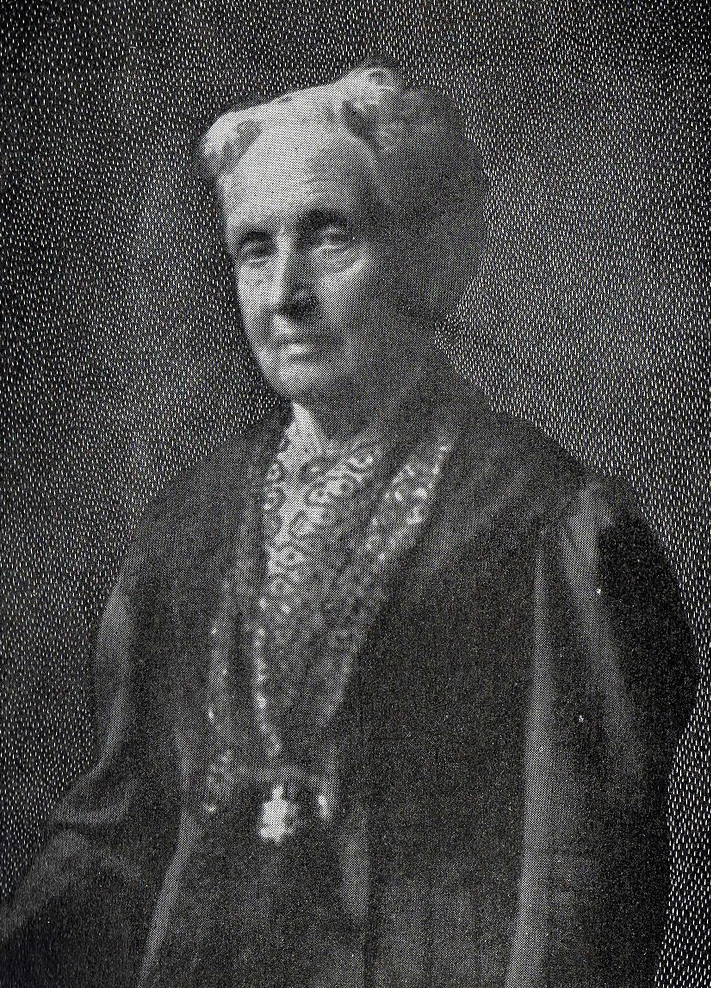
Gaston’s article mentions Dr. Alice Stockham, the fifth female physician in the United States, who was a leading publisher and writer on women’s health issues. She was already a vegetarian. Stockham was a friend of Fairhoper Lydia J. Newcomb Comings who was educated and taught in Chicago, Illinois. Comings, a physical fitness instructor, toured the United States with her 1893 book, “Muscular Exercise for Health and Grace,” which not only included exercise but lessons on elocution, posture, breathing, walking and the importance of loose-fitting clothing for women. Stockham had been to Fairhope on at least one other occasion and donated a collection of her books to Marie Howland for inclusion in the Fairhope Free Public Collection. Donated books included 1893’s “Koradine: Letter to a Young Girl” and “Tokology,” a guide to gynecology and midwifery, which when published in 1883 was distributed to poor Chicago women along with a certificate for a free gynecological exam.
In between visits, Mrs. Stockham, at the age of 72, was convicted of violating the Comstock Act, sending obscene material through the mail. Stockham was defended by Clarence Darrow, another regular visitor to Fairhope in the 1920s and 1930s. Found guilty, Stockham never served any prison time, but she was forced to close her publishing company.
Like other intellectuals visiting Fairhope, Stockham spoke on various subjects of interest. During this visit, she spoke to the community about her travels to China and about her visit with Leo Tolstoy in Russia. A proponent of Henry George’s single tax theory, Tolstoy and Stockham would have discussed the Fairhope Colony.
When Stockham arrived in Fairhope in 1909, she had just returned from Russia and her visit with Tolstoy. Years earlier, she had translated and published Tolstoy’s book, “The Kreutzer Sonata,” which was inspired by “Tokology,” and banned in Russia. While in Fairhope, Stockham gave a talk about her visit with Tolstoi, as he was often referred to back then and after that meeting, she held a separate meeting for women only.
In addition to Sinclair and Stockham, another writer was enjoying Fairhope’s warm climate.
In “The Autobiography of Upton Sinclair,” he writes about his Fairhope time and his friendship with writer and “socialist comrade” Eugene Wood, who stayed at the Colonial Inn during his visit.

According to Sinclair, Wood wrote, “a jolly piece about ‘America’s leading raw-food advocate who happens just now to be living upon a diet of stewed beefsteaks.’ I had to bow my head, and add crow to my menu!” Wood would stay in touch with Fairhope, penning several letters to the Fairhope Courier about Fairhope’s beauty, but also its remoteness.
After the raw food supper of lettuce, cabbage, mission figs, shredded wheat biscuits, soaked prunes, eggs, sliced tomatoes, apples, oranges and bananas, “some mental pabulum was provided,” according to Gaston, with Wood, Stockham and Sinclair giving short speeches.
Where was Marietta Johnson? After all, it was her schoolrooms. She was there. Music was always part of a Fairhope gathering and this event was no exception. The director of the school, according to Gaston, was one of the “altos,” singers who performed a parody of a classic song with the words “all the meat must go.”
Despite the humorous remarks about the “raw food faddists after the banquet,” no one left hungry. The women at this supper wore no restrictive undergarments, drank only lemonade, and were suffragists eager for the vote and equal opportunity in the labor force. They were ahead of their time, and in some cases, even our own.
Through the decades, Fairhope has continued this literary lineage. The Fairhope Center for the Writing Arts Wolff Cottage offers writers a quaint and quiet residence in which to pursue their work. A place where writers like Suzanne Hudson, Joe Formichella, Sonny Brewer and Skip Jones gather with each other to share stories about Winston Groom, WEB Griffin (aka Bill Butterworth), Jimmy Buffett, Fannie Flagg and so many more. It’s a town where writers share a meal, exchange ideas and keep pursuing the written word.
Alan Samry is a former writer in residence at the Wolff Cottage and is the librarian at Coastal Alabama Community College.

